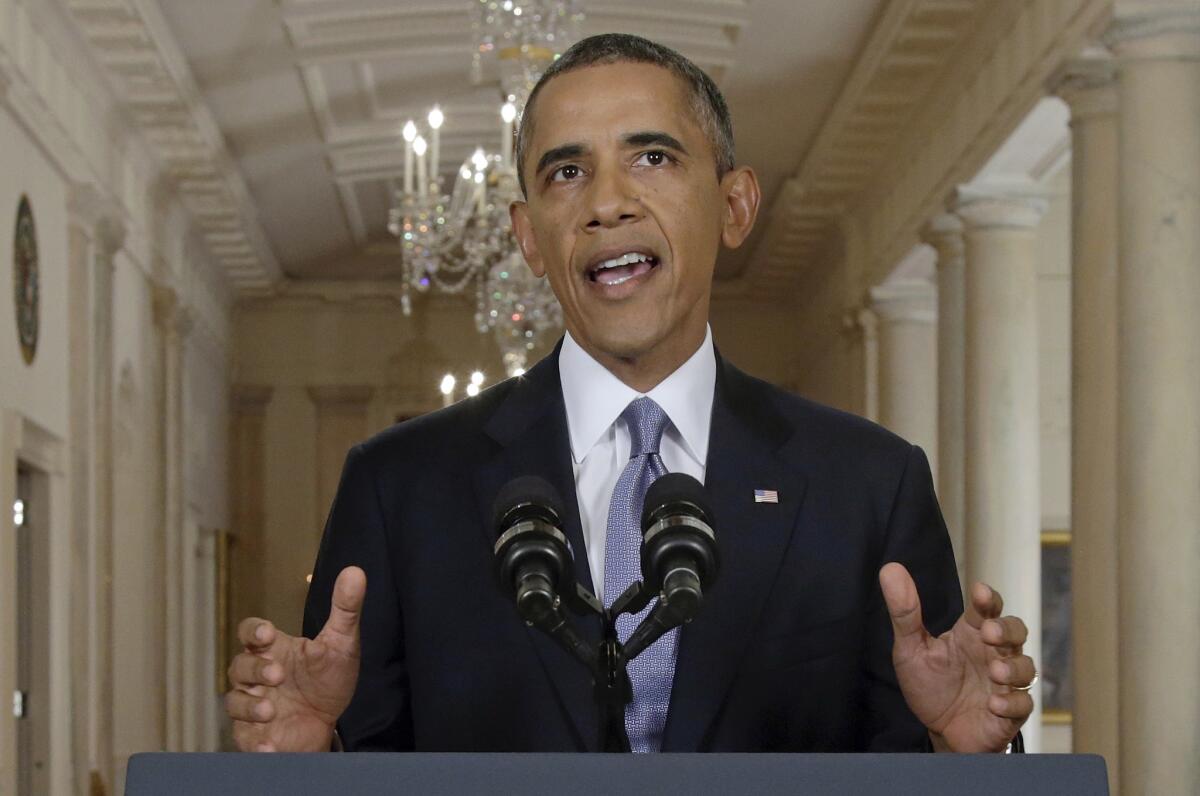Obama, the reluctant warrior on Syria

On Tuesday, President Obama made the case for a limited military strike in Syria if diplomacy fails.
But he still sounded like a man looking for an escape hatch.
“I’ve spent 4 1/2 years working to end wars, not to start them,” he said. “Our troops are out of Iraq. Our troops are coming home from Afghanistan. And I know Americans want all of us in Washington — especially me — to concentrate on the task of building our nation here at home.”
TRANSCRIPT: The argument for action on Syria
He’d hit that same reluctant warrior theme in a spate of television interviews the day before the speech. In those appearances, the president returned again and again to all the reasons he hoped to avoid military action against Syria, and said very little about his once-fervent goal of driving Syrian President Bashar Assad out of power.
“This is not a problem I’m looking for,” he told CBS. “I’m not looking for an excuse to engage in military action…. My central goal throughout this process has not been to embroil ourselves in a civil war.”
It’s also clear that Obama would prefer not to launch even limited airstrikes over the opposition of most Americans and Congress. As he told NBC: “For me, the president, to act without consensus in a situation where there’s not a direct imminent threat to the homeland or [U.S.] interests around the world, well, that’s not the precedent I want to set.”
Small wonder that Obama embraced the sudden (if still unlikely) prospect of a negotiated deal with enthusiasm, and even took pains not to set the talks’ goals too high.
“My narrow concern,” he said, “is making sure that Assad does not use these chemical weapons again.”
That’s a narrow goal that now, thanks to an unexpected diplomatic assist from Russia, of all countries, just might be achievable — unlike Obama’s attempts to move public opinion, win a vote in Congress or build an international alliance in favor of military action.
It’s been a bad three weeks for Obama and his foreign policy team. A president who proclaimed that use of chemical weapons would cross a “red line” discovered that a Syrian despot was willing to call his bluff not once but a dozen times.
A president who relied on antiwar eloquence to win his job found it harder to move public opinion when he tried to sell a military intervention he didn’t sound completely sold on himself.
A president whose foreign policy was based on rejecting unilateralism found himself without many allies after Britain’s prime minister couldn’t persuade his Parliament either.
A president who prides himself on running a no-drama White House couldn’t keep his staff on the same page: Secretary of State John F. Kerry has consistently sounded more hawkish than the president, and Army Gen. Martin Dempsey, chairman of the Joint Chiefs of Staff, more skeptical.
White House aides tried to spin Russia’s offer as the product of Obama’s deft diplomacy, but it didn’t look so deft close up. Instead, Obama’s missteps turned what could have been a brief episode — the initial plan was for about 48 hours of missile strikes that would have been over a week ago — into a long-running melodrama.
Obama has belatedly discovered something Bill Clinton and other presidents learned the hard way: It’s possible to commit U.S. military forces to action without much public support, but only if you bring clarity, resolve, patient diplomatic preparation and an impressive list of allies.
Now the president is hoping that Assad and Russia’s Vladimir Putin will help him find a way out. They may, but there’s no reason to expect that they’ll make it easy.
In any case, Syria’s chemical weapons aren’t likely to disappear quickly. Even if Assad follows through on his foreign minister’s promise to join the Chemical Weapons Convention, implementing the treaty normally takes years.
Libya’s Moammar Kadafi signed up in 2004, but only about half the country’s stockpile of weapons had been destroyed by the time he fell seven years later.
The United States and Russia are still dismantling their chemical weapons arsenals, even though more than two decades have passed since the end of the Cold War.
Besides, in the Middle East, every silver lining has a cloud. It’s not clear what impact even a successful outcome of the chemical weapons crisis would have on the larger problem of Syria’s civil war. Obama said he hoped a diplomatic solution on chemical weapons might lead to a peaceful resolution of the larger conflict.
But one of his own former advisors on Syria, Frederic C. Hof of the Atlantic Council, says the outcome could work the other way, especially if Congress makes it clear that it won’t authorize military action.
“Without the credible threat of military force on the table … [Assad] will return to business as usual, killing and terrorizing large numbers of civilians using conventional weapons,” Hof warned.
U.S. policy on the Syrian civil war has often seemed like a search for the least bad option. Even now, when a diplomatic solution to the chemical weapons crisis seems possible, that’s still true. Assad may agree to stop gassing his enemies, but Syria’s larger problems are a long way from being solved.
doyle.mcmanus@latimes.com Twitter: @DoyleMcManus
More to Read
A cure for the common opinion
Get thought-provoking perspectives with our weekly newsletter.
You may occasionally receive promotional content from the Los Angeles Times.







